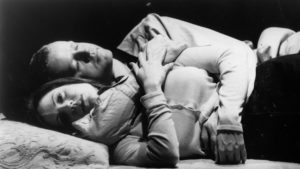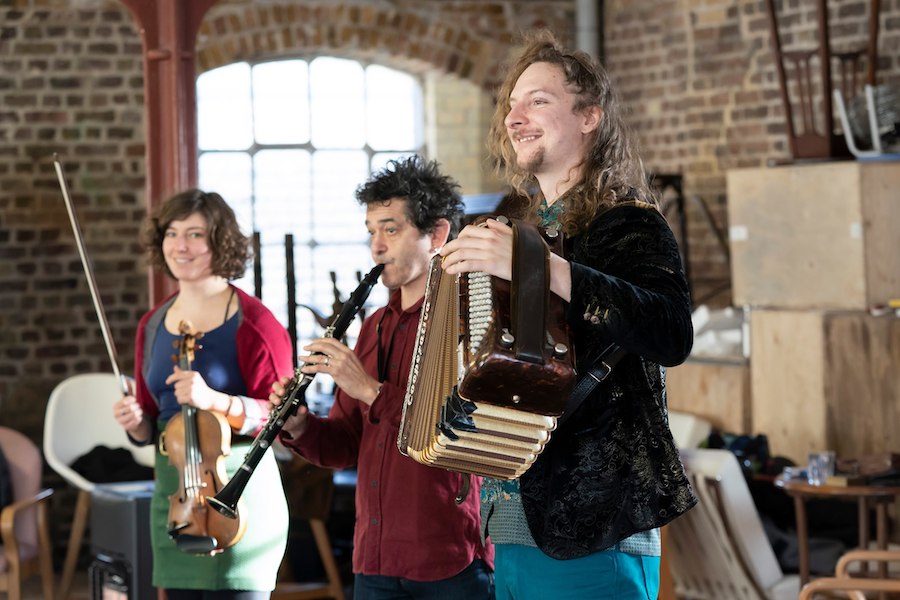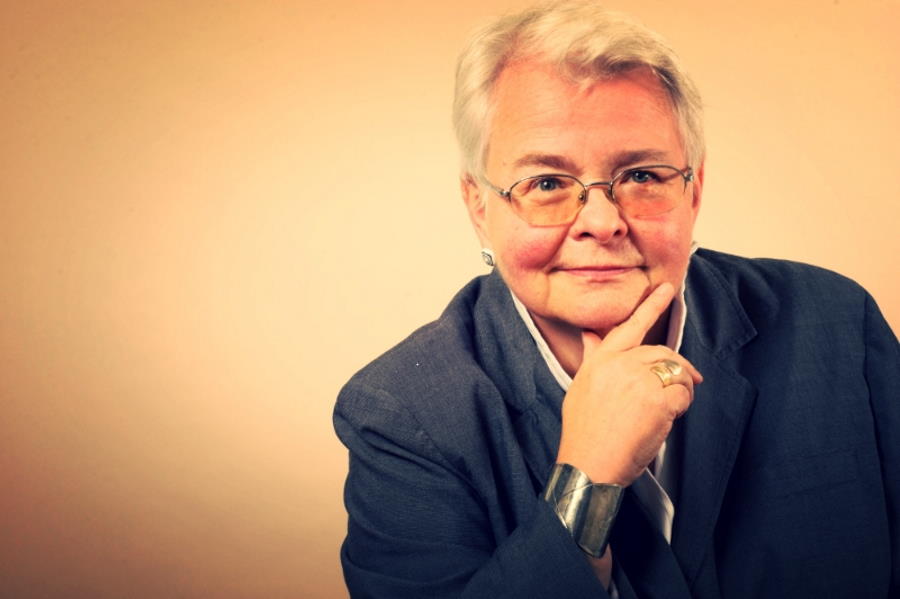Paula Vogel is hunkering down in the sleepy, coastal town of Wellfleet, Mass., where she’s toasting should-be opening nights in the company of her two dogs, Alice and Dingo. She raised a glass this past weekend for the London premiere of her play Indecent at the Menier Chocolate Factory, and on April 22 she’ll clink for the Broadway debut of How I Learned to Drive—virtual toasts, mind you, as both productions were postponed due to the coronavirus pandemic. In March, just as theatres began announcing postponements and season cancellations en masse, I spoke to Paula on the phone as she drove from Rhode Island home to Wellfleet.
ALLISON CONSIDINE: How are you doing?
PAULA VOGEL: I’m good. I’m driving from Rhode Island back—I actually live in Wellfleet, Mass., now. At any time of off season it is really social distancing. There’s nobody there, so it is kind of great in that way.
I’m probably like everyone else in our field—I’m trying to figure out how to help financially. So I’m involved in several initiatives, including Taylor Mac’s [TrickleUp NYC], I’m in discussion with the Lillys, and also trying to think about how to help theatre companies. I’m very worried that places like the Vineyard survive this, which is my really home base. [Editor’s note: The Vineyard Theatre has just launched the Roth-Vogel New play Commission]. I’m really fortunate in that I had all of the shows canceled, and therefore I don’t have to worry about all of these artists and collaborators getting sick by performing in the public eye, you know? And of course it is a little bit of melancholia. I’m toasting my colleagues, who had opening nights on the same opening nights that I had. We’re toasting to a future opening night. I think that this disease just reprioritizes everything.
The next step for me, and the next piece for me, is to try and figure out how to continue the teaching with an online presence. I’m about to watch Young Jean Lee, who has boldly gone out there, which is great, and I want to have conversations with the Vineyard to see if there is a way I can do hourlong classes and workshops online. I think we’re all going to be heading in that direction. I am writing a playwriting book and the next play, but all that has to do with settling down and ignoring the television.
There’s a lot of pressure to be productive during quarantine, especially for writers to produce new work. What are your feelings around that?
I think that as artists we live on stolen time. Truthfully, in my own life, my stolen time has always been when I’ve been laid off work. When I’ve been fired from teaching gigs or an office gig. I’ve always taken that six months of unemployment and written something. I think it’s our ingrained response of being members of the gig economy—finding time when we can find it. Now, that said, I’m thinking of all of my colleagues with children, and so the notion of space is a very different thing. I’m hoping that those of us who are productive in that way think of more and more online resources to kind of snare the attention of 2-year-olds to 18-year-olds, to give back some of that time.

I was very much looking forward to seeing How I Learned to Drive. I’ve read it a few times but have never seen a production.
In addition to How I Learned to Drive, I have a new play with Marianne Elliott in London, and who knows what the course of the disease and the economics will be there. What I’m hoping is that we finally get unions to re-look at streaming theatre—that we start to look more at videotaping and streaming in the way that London does. This actually enhances audience participation in productions, rather than diminish it. So I’m very interested to see what’s happening, and I’ve had a couple of discussions about podcasting How I Learned to Drive, and finding ways to just think of this next 12 months as a way of meeting the need that we all have for community. That is what theatre is—it is a virtual community. I’m hoping there will be initiatives that are going to strengthen our community.
It’s amazing to see how the theatre community has come together these past few weeks.
This is an incredibly generous community. The number of friends and colleagues who just check in on me…I’m in the high-risk group and my health is, you know, a little precarious. I’m 68 years old. Just to see how everyone is reaching out to help each other. I think the elder playwrights are very concerned about emerging playwrights. We don’t want momentum stopped in terms of the writing of new work. Sanctuary City and Wolf Play, for me, are plays I’ve been looking forward to for months. And of course I’ve been looking forward to seeing Company. It’s not that I don’t look forward to Broadway, but the truth of the matter is, I think our lifeblood is in Off-Broadway for new plays. And for new collaborations, new directors, really interesting actors—that is all Off-Broadway. And those are the most precarious economic institutions. That’s why I think we’re springing into action, trying to figure out how we can contribute. I am anticipating that I will continue the Yale Drama Series, so that hopefully by the fall, when we’ve found emerging writers, that there are going to be theatre companies to contemplate producing them the following spring.
I’m actually okay with the isolation, in that, for writers, we’re used to being holed up on rewrites or first drafts. And then we come blinking into the sun with the first draft—and that’s where the social component kicks in. But I think I’m okay! [Laughs] I have two dogs and long walks. So I consider myself lucky.

I saw that you did a Bake-Off online. How is that going?
I did, I did. It is going well, I think! A number of people are reaching out telling me they’re doing it. I am so proud of the University of Minnesota and the Guthrie Theater for doing their COVID Bake Off—they had more than 1,000 participants. With this, I think for the foreseeable nine months or the year, every month or so I’ll just put up another Bake-Off. I just want to put them up, and as people do them, they can contact me, tag me, but I’d really love it to be a community-by-community initiative. It’s our way of not losing our sanity, hopefully, and having fun by making a virtual community for Bake-Offs.
How do you think the coronavirus might shape the theatrical canon? Will it?
It will. What I’ve been thinking about is that this is the second plague in my lifetime. When I was caretaking my brother Carl, who died of HIV, we didn’t know how it was spread. So as a family, we came together and just realized that we’d grown complacent with the belief that science will save us. And then you reach this moment where HIV is spreading and you don’t know how, and you know that you have a moral imperative to go into the room and nurse your brother. It brought me back, to not only the Spanish Flu, but to the early 20th century and late 19th century, when entire families were wiped out by typhoid or cholera. I think that what COVID is doing is getting all of us in touch with a hovering mortality that we always have; we just grow complacent. The good news about COVID versus HIV is that there was enormous shame, inaction, and a kind of shunning that I experienced that I don’t think is happening with this disease. But I do think that it is going to make us much more aware of community and of the necessity to be kind. And the fact that when science fails us, and it will, kindness never will.
What will be the lasting impact for theatremakers and theatregoers?
I think that what the absence of theatre is going to do to us as a community—we’ve been complacent about theatre in the same way we have been complacent about science. “Oh, it’s always going to be there for us.” I think it is making us recognize that theatre, music, performance, dance—that these are not extraneous luxuries, they are essential. So, whereas there will be some trepidation, there will also be a great excitement when the theatres reopen. I think that people are going to rush back and just profoundly enjoy being able to sit in an audience. I know I am.
Oh, me too.
I hope I see everybody on the other side of this. Not to be morbid, but the nice thing about reaching this age and looking forward to the last quarter of my life is that every play that I do now, for a long time, I’m thinking, “Is this important enough to be the last play I may ever do?” before I say yes to a project. I very much felt that with Indecent. I thought: Okay, if this is as long as God gives me, I’m very happy and very proud of it. Again, something like this rebrands our priorities to say to ourselves as artists: What we do is essential.


